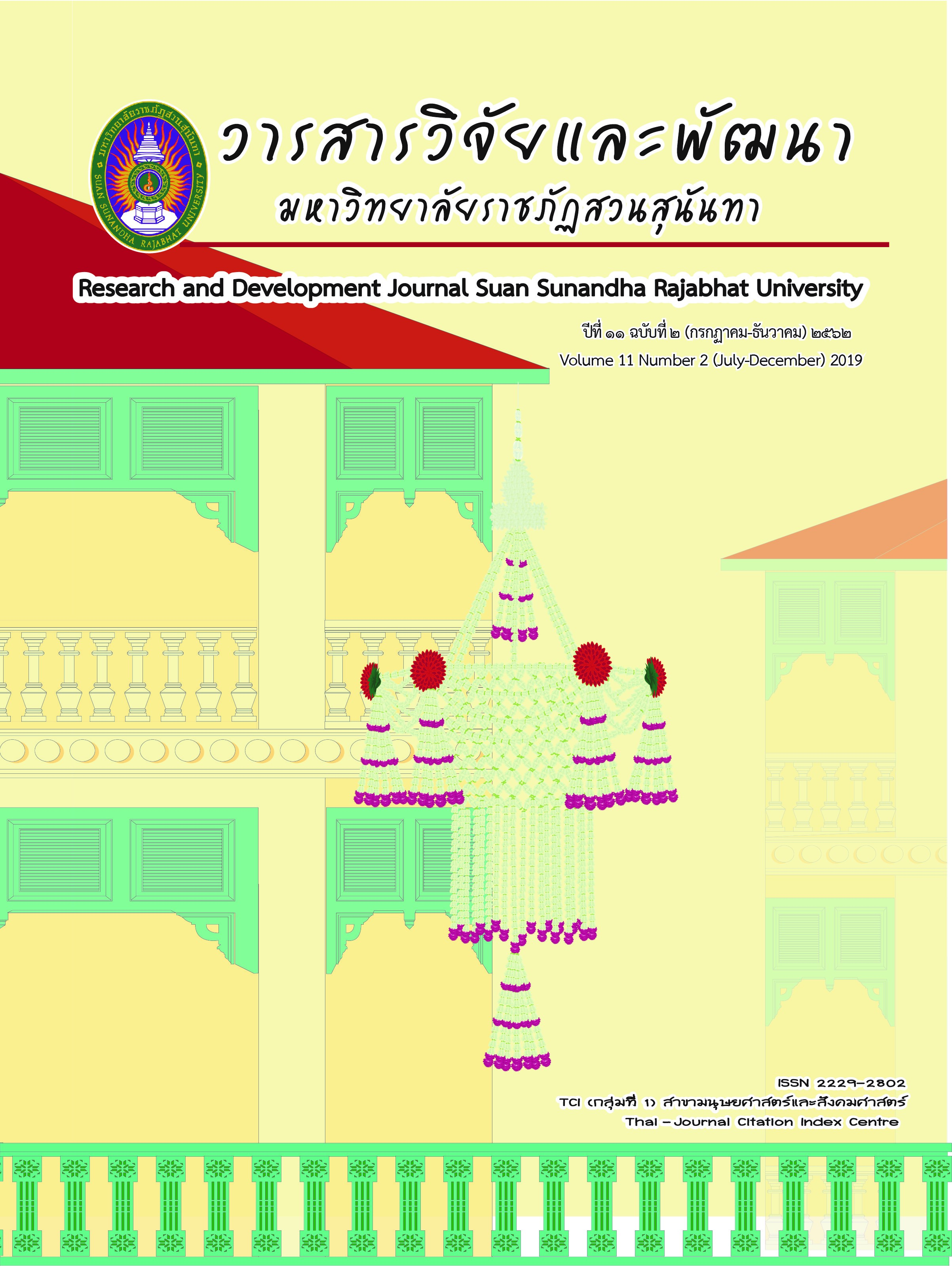บุพปัจจัยที่ส่งผลต่อคุณภาพชีวิตในครอบครัวของหมู่บ้านต้นแบบเศรษฐกิจพอเพียง
คำสำคัญ:
บุพปัจจัย, คุณภาพชีวิต, เศรษฐกิจพอเพียงบทคัดย่อ
การวิจัยครั้งนี้ศึกษาทัศนคติของผู้นำครอบครัว การมีส่วนร่วมกิจกรรมทางสังคมของสมาชิก คุณภาพชีวิตและพัฒนาแบบจำลองสมการโครงสร้างเชิงสาเหตุของคุณลักษณะพื้นฐานบุคคล การมีส่วนร่วมกิจกรรมทางสังคม การนำหลักปรัชญาของเศรษฐกิจพอเพียงไปใช้ในครอบครัว และทัศนคติของผู้นำครอบครัวต่อคุณภาพชีวิตในครอบครัวของหมู่บ้านต้นแบบเศรษฐกิจพอเพียง เป็นการวิจัยเชิงผสมผสานระหว่างการวิจัยเชิงปริมาณและการวิจัยเชิงคุณภาพ กลุ่มตัวอย่าง คือ ผู้นำครอบครัว จำนวน 400 ราย เก็บข้อมูลด้วยแบบสอบถาม และวิเคราะห์ข้อมูลด้วยแบบจำลองสมการโครงสร้าง สำหรับการเก็บข้อมูลเชิงคุณภาพผู้ให้ข้อมูลหลักเป็นผู้นำหมู่บ้านต้นแบบเศรษฐกิจพอเพียง จำนวน 17 คน พบว่า 1) ผู้นำครอบครัว ส่วนใหญ่มีอายุระหว่าง 31- 45 ปี การศึกษาระดับประถมศึกษา และมีรายได้ไม่เกิน 10,000 บาทต่อเดือน 2) ระดับการมีส่วนร่วมกิจกรรมทางสังคมของสมาชิกในครอบครัว อยู่ในระดับปานกลาง ทัศนคติของผู้นำครอบครัวต่อหลักปรัชญาของเศรษฐกิจพอเพียงอยู่ในระดับปานกลาง การน้อมนำหลักปรัชญาของเศรษฐกิจพอเพียงไปใช้ในระดับครอบครัวอยู่ในระดับมาก และระดับคุณภาพชีวิตของครอบครัวอยู่ในระดับปานกลาง 3) แบบจำลองสมการโครงสร้างที่ดำเนินการมีความกลมกลืนกับข้อมูลเชิงประจักษ์โดยพบเส้นทางความสัมพันธ์ในแบบจำลองที่ค่าสัมประสิทธิ์อิทธิพลสูงที่สุด ได้แก่ การมีส่วนร่วมกิจกรรมทางสังคมของสมาชิกในครอบครัว รองลงมาก ได้แก่ ทัศนคติของผู้นำครอบครัวต่อหลักปรัชญาของเศรษฐกิจพอเพียง และการน้อมนำหลักปรัชญาของเศรษฐกิจพอเพียงไปใช้ในระดับครอบครัวตามลำดับ ที่สำคัญอย่างยิ่ง คือการส่งเสริมให้มีปฏิบัติซ้ำ ๆ กับการมีส่วนร่วมของสมาชิกแต่ละครอบครัวในหมู่บ้านมามีส่วนในกิจกรรมจิตอาสาการพัฒนาสังคม รักษาสืบสานวัฒนธรรมประเพณีท้องถิ่น นอกจากนี้ ยังพบว่า หลักปรัชญาของเศรษฐกิจพอเพียงส่งผลโดยตรงให้คุณภาพชีวิตของประชาชนดีขึ้น คุณภาพชีวิตที่ดีไม่ได้ขึ้นอยู่กับฐานะแต่คนก็สามารถมีความสุขได้และสามารถทำนายคุณภาพชีวิตของครอบครัว ได้ร้อยละ 81 ผลการวิจัยสามารถนำไปใช้เป็นต้นแบบในการน้อมนำหลักปรัชญาของเศรษฐกิจพอเพียงไปใช้ในชีวิตกิจวัตรประจำวัน อันเป็นพื้นฐานสำคัญต่อการสร้างความมั่นคงและคุณภาพชีวิตที่ดีขึ้นของครอบครัว ถึงแม้จะยากจนหากดำเนินชีวิตตามเศรษฐกิจพอเพียง ก็สามารถมีคุณภาพชีวิตที่ดีได้อย่างยั่งยืน
เอกสารอ้างอิง
Adiwattanasit. C., at el. (2005). Social development system that leads to human security. Bangkok: Netik Printing.
Atchara rakphan-Warisorn rakphan. (2017). Application the philosophy Create our economy to society. JIBjib in-Flight Magazine, January 2017 pp. 62-63.
Bhumibol Adulyadej, King Rama IX. (2009). Kham Pho Teaching: The Royal Speech and Royal Speech about Sufficiency Economy. Phra Dabos Foundation (8th Ed.). Bangkok: Bangkok.
Central Bureau Voor de Statistiek. (2011). The Personal Wellbing Index Construct validity for the Netherlands. Discussion Paper. pp.1-26.
Chaemchan, C. (2013). Human Development Index of 2013 and the Glory of the World (South). Journal of Population and Development: Year 33, Issue 5 Jun-Jul 2013. pp. 6-7.
CIW international Advisory network. (2016). Canadian Index of Wellbing 2016. Update Report for the CIW international Advisory network. p. 1-14.
Cohen, J. M. & Uphoff, N. T. (1977). Rural development participation: Concept and measures for project design implementation and evaluation. Rural Development Committee Center for International Studies. New York: Cornell University.
Committee on the Development of the Quality of Life of the People (PPSD.). (2016). Report of the Thai Rural Village Based on village-level basic information (Korchocho 2 Kor) 2015. Bangkok: Department of Community Development, Ministry of the Interior.
Community Strengthening Bureau. (2014). Document "Leading with the expansion of the village sufficiency economy by community capital". Bangkok: Department of Community Development.
Department of Agricultural Extension Ministry of Agriculture and Cooperatives. (2017). Mixed farming (3rd Ed.). Bangkok: New Thammada Printing.
Des Gasper. (2004). “Subjective and Objective Wellbeing in Relation to EconomicInputs: Puzzlesand Responses”.WeD Working Paper 09.
Hasoontree, N. (2018). A Model of Quality of Life Development According to Sufficiency Economy Philosophy of People in Chiang-Rai Provinve. IACEMI2018 at Courtyard By Marriott Budapest City Center Hotel Hungary.
Information and Communication Information Group, Mae Hong Son Provincial Office. (2017). Summary of Annual Report 2016, Mae Hong Son Province. Searched on 14 May 2017. from https://www.maehongson.go.th/usrupl/maehongson/document/mhs_brife2559.pdf
Juchooy, S. (2011). The Way of Life of People Living in Bangkhanoon Community Under the Local Cultural Change. Nonthaburi: Ratchaphruek College.
Kahneman, D. (1999). Objective happiness, in Kahneman, D., Diener, E. and Schwarz, N.(eds) Well-Being: The Foundations of Hedonic Psychology. New York: Sage.
Karma Ura & Karma Galay, (2004). Gross National Happiness and Development. The Centre for Phutan Studies. Thimphu Bhutan. Documents for the international seminar: Operationalization of Gross National Happiness 1st 18-20 February at Thimphu Bhutan.
Karma Ura et al. (2012). A Short Gide to Gross National Happiness Index. The Center for Phutan Studies. pp. 1-13.
Kasemsuk, C. (2014). Principles of participation in sustainable community development. The King: Active Print Chulalongkorn University.
Maslow, A. H. (1954). Motivation and Personality. New York: Harper Collins.
NESDB. (2006). Conceptual framework for the development of cool happiness index is a common happiness in Thai society. Bangkok: Bureau of Evaluation and Development.
NESDB. (2015). Somdej Phra Thep Chaofa developer. Bangkok: Amarin Printing and Publishing.
Office of the National Health System Reform (NHSR.). (2005). Include indicators for well-being. Bangkok: Thanatach Printing.
Phillips, D. (2006). Quality of Life: Concept, policy and practice. New York: Routledge (Taylor & Francis Group).
Phornkornkleeb, D. (2008). Antecedents and Outcomes of Household Development based on the Philosophy of Sufficiency Economy. Dissertation Doctor of Philosophy Program Development Administration Social Development College Suan Sunandha Rajabhat University.
Phukamchanoad, P. (2016). Guideline for Social Network Development to Environmental and Way of Life Conservation to Sustainable Tourism in Taling-Chan Bangkok. Research of Suan Sunandha Rajabhat University.
Phukamchanoad, P. (2017). Social Development for Happiness Base on Philosophy of Sufficiency Economy affected to Paddy Field and Rock Salt Field with Participation of The Baan Dung District, Udon Thani Province, Thailand. Research of Suan Sunandha Rajabhat University.
Phukamchanoad, P., et al. (2019). Public participation of people in community development administration based on the sufficient economy philosophy at the sufficient economy model community of mae hong son province. In e-Proceeding Zurich 2019, The 2019 International Academic Research Conference in Zurich, ICBTS, pp. 70-76.
Poollarp, S. (2011). Social Capitals and Self-Reliance in accordance to the King Bhumibol Philosophy of the Ethnic Communities in the Mok Cham Royal Project. Dissertation Doctor of Philosophy Program Development Administration Social Development College Suan Sunandha Rajabhat University.
Tanthaariya, U. (2016). A Development of the Well-Being Indicators of the People in Phangnga Province. Doctor of Philosophy Program in Innovation Management, Suan Sunandha Rajabhat University.
The Chaipattana Foundation. (2014). “Sufficiency Economy and The New Theory”. Bangkok: Amarin Printing & Publishing.
The international wellbeing group manual 2006. (2008). Personal Wellbeing Index-Adult: PWI-A (English) (4th Ed). Published by the Australian center on Quality of Life, Deak in University. p. 13.
Theerawattanakul, P. (2012). Balance between work and life. Searched on 16 November 2018 from www.globaldynamicinsights.com. pp. 3-5.
Theerawattanakul, P. (2013). Measuring National Wellbeing. Searched on 16 November 2018 from www.globaldynamicinsights.com. pp. 3-6.
Thiangtham, V., et al. (2011). Community potential development: concepts and applications. Bangkok: Danex Inter Corporation.
United Nations Development Program. (2010). Human Development Index: HDi. UNDP.
Villiamward, V. V., et al. (2011). Complete report The Movement for Gross National Happiness to a new paradigm for change. Bangkok: Mina Silver Park together with Parties and Gross National Happiness Network.
Wasi, P. (1999). Sufficiency Economy and Civil Society Guidelines for reviving sufficiency economy and new theories. Bangkok: Doctor, villager.
ดาวน์โหลด
เผยแพร่แล้ว
รูปแบบการอ้างอิง
ฉบับ
ประเภทบทความ
สัญญาอนุญาต
บทความที่ได้รับการตีพิมพ์เป็นลิขสิทธิ์ของ สถาบันวิจัยและพัฒนา มหาวิทยาลัยราชภัฎสวนสุนันทา
ข้อความที่ปรากฏในบทความแต่ละเรื่องในวารสารวิชาการเล่มนี้เป็นความคิดเห็นส่วนตัวของผู้เขียนแต่ละท่านไม่เกี่ยวข้องกับมหาวิทยาลัยราชภัฎสวนสุนันทา และคณาจารย์ท่านอื่นๆในมหาวิทยาลัยฯ แต่อย่างใด ความรับผิดชอบองค์ประกอบทั้งหมดของบทความแต่ละเรื่องเป็นของผู้เขียนแต่ละท่าน หากมีความผิดพลาดใดๆ ผู้เขียนแต่ละท่านจะรับผิดชอบบทความของตนเองแต่ผู้เดียว





